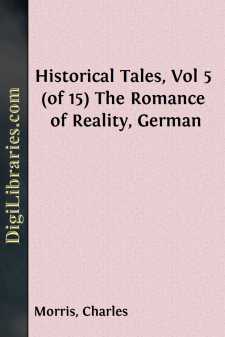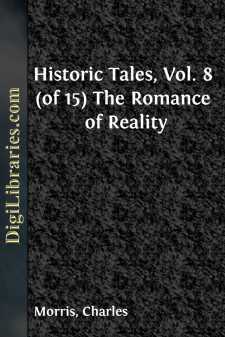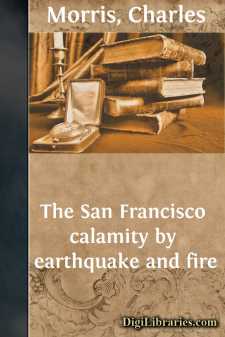Categories
- Antiques & Collectibles 13
- Architecture 36
- Art 48
- Bibles 22
- Biography & Autobiography 813
- Body, Mind & Spirit 142
- Business & Economics 28
- Children's Books 15
- Children's Fiction 12
- Computers 4
- Cooking 94
- Crafts & Hobbies 4
- Drama 346
- Education 46
- Family & Relationships 57
- Fiction 11828
- Games 19
- Gardening 17
- Health & Fitness 34
- History 1377
- House & Home 1
- Humor 147
- Juvenile Fiction 1873
- Juvenile Nonfiction 202
- Language Arts & Disciplines 88
- Law 16
- Literary Collections 686
- Literary Criticism 179
- Mathematics 13
- Medical 41
- Music 40
- Nature 179
- Non-Classifiable 1768
- Performing Arts 7
- Periodicals 1453
- Philosophy 64
- Photography 2
- Poetry 896
- Political Science 203
- Psychology 42
- Reference 154
- Religion 513
- Science 126
- Self-Help 84
- Social Science 81
- Sports & Recreation 34
- Study Aids 3
- Technology & Engineering 59
- Transportation 23
- Travel 463
- True Crime 29
Historical Tales, Vol. 4 (of 15) The Romance of Reality
by: Charles Morris
Description:
Excerpt
HOW ENGLAND BECAME CHRISTIAN.
One day, in the far-off sixth century, a youthful deacon of the Roman Church walked into the slave-market of Rome, situated at one extremity of the ancient Forum. Gregory, his name; his origin from an ancient noble family, whose genealogy could be traced back to the days of the early Cæsars. A youth was this of imperial powers of mind, one who, had he lived when Rome was mistress of the physical world, might have become emperor; but who, living when Rome had risen to lordship over the spiritual world, became pope,—the famous Gregory the Great.
In the Forum the young deacon saw that which touched his sympathetic soul. Here cattle were being sold; there, men. His eyes were specially attracted by a group of youthful slaves, of aspect such as he had never seen before. They were bright of complexion, their hair long and golden, their expression of touching innocence. Their fair faces were strangely unlike the embrowned complexions to which he had been accustomed, and he stood looking at them in admiration, while the slave-dealers extolled their beauty of face and figure.
"From what country do these young men come?" asked Gregory.
"They are English, Angles," answered the dealers.
"Not Angles, but angels," said the deacon, with a feeling of poetic sentiment, "for they have angel-like faces. From what country come they?" he repeated.
"They come from Deira," said the merchants.
"De irâ" he rejoined, fervently; "ay, plucked from God's ire and called to Christ's mercy. And what is the name of their king?"
"Ella," was the answer.
"Alleluia shall be sung there!" cried the enthusiastic young monk, his imagination touched by the significance of these answers. He passed on, musing on the incident which had deeply stirred his sympathies, and considering how the light of Christianity could be shed upon the pagan lands whence these fair strangers came.
It was a striking picture which surrounded that slave-market. From where the young deacon stood could be seen the capitol of ancient Rome and the grand proportions of its mighty Coliseum; not far away the temple of Jupiter Stator displayed its magnificent columns, and other stately edifices of the imperial city came within the circle of vision. Rome had ceased to be the mistress of the world, but it was not yet in ruins, and many of its noble edifices still stood almost in perfection. But paganism had vanished. The cross of Christ was the dominant symbol. The march of the warriors of the legions was replaced by long processions of cowled and solemn monks. The temporal imperialism of Rome had ceased, the spiritual had begun; instead of armies to bring the world under the dominion of the sword, that ancient city now sent out its legions of priests to bring it under the dominion of the cross.
Gregory resolved to be one of the latter. A fair new field for missionary labor lay in that distant island, peopled by pagans whose aspect promised to make them noble subjects of Christ's kingdom upon earth. The enthusiastic youth left Rome to seek Saxon England, moved thereto not by desire of earthly glory, but of heavenly reward....












